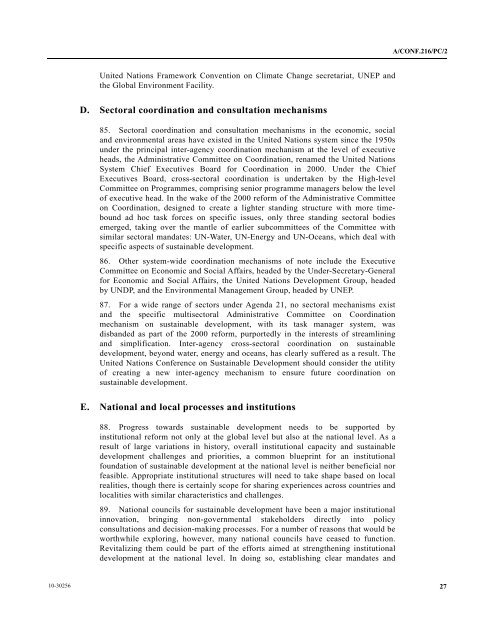General Assembly - UN Documents
General Assembly - UN Documents
General Assembly - UN Documents
You also want an ePaper? Increase the reach of your titles
YUMPU automatically turns print PDFs into web optimized ePapers that Google loves.
A/CONF.216/PC/2<br />
United Nations Framework Convention on Climate Change secretariat, <strong>UN</strong>EP and<br />
the Global Environment Facility.<br />
D. Sectoral coordination and consultation mechanisms<br />
85. Sectoral coordination and consultation mechanisms in the economic, social<br />
and environmental areas have existed in the United Nations system since the 1950s<br />
under the principal inter-agency coordination mechanism at the level of executive<br />
heads, the Administrative Committee on Coordination, renamed the United Nations<br />
System Chief Executives Board for Coordination in 2000. Under the Chief<br />
Executives Board, cross-sectoral coordination is undertaken by the High-level<br />
Committee on Programmes, comprising senior programme managers below the level<br />
of executive head. In the wake of the 2000 reform of the Administrative Committee<br />
on Coordination, designed to create a lighter standing structure with more timebound<br />
ad hoc task forces on specific issues, only three standing sectoral bodies<br />
emerged, taking over the mantle of earlier subcommittees of the Committee with<br />
similar sectoral mandates: <strong>UN</strong>-Water, <strong>UN</strong>-Energy and <strong>UN</strong>-Oceans, which deal with<br />
specific aspects of sustainable development.<br />
86. Other system-wide coordination mechanisms of note include the Executive<br />
Committee on Economic and Social Affairs, headed by the Under-Secretary-<strong>General</strong><br />
for Economic and Social Affairs, the United Nations Development Group, headed<br />
by <strong>UN</strong>DP, and the Environmental Management Group, headed by <strong>UN</strong>EP.<br />
87. For a wide range of sectors under Agenda 21, no sectoral mechanisms exist<br />
and the specific multisectoral Administrative Committee on Coordination<br />
mechanism on sustainable development, with its task manager system, was<br />
disbanded as part of the 2000 reform, purportedly in the interests of streamlining<br />
and simplification. Inter-agency cross-sectoral coordination on sustainable<br />
development, beyond water, energy and oceans, has clearly suffered as a result. The<br />
United Nations Conference on Sustainable Development should consider the utility<br />
of creating a new inter-agency mechanism to ensure future coordination on<br />
sustainable development.<br />
E. National and local processes and institutions<br />
88. Progress towards sustainable development needs to be supported by<br />
institutional reform not only at the global level but also at the national level. As a<br />
result of large variations in history, overall institutional capacity and sustainable<br />
development challenges and priorities, a common blueprint for an institutional<br />
foundation of sustainable development at the national level is neither beneficial nor<br />
feasible. Appropriate institutional structures will need to take shape based on local<br />
realities, though there is certainly scope for sharing experiences across countries and<br />
localities with similar characteristics and challenges.<br />
89. National councils for sustainable development have been a major institutional<br />
innovation, bringing non-governmental stakeholders directly into policy<br />
consultations and decision-making processes. For a number of reasons that would be<br />
worthwhile exploring, however, many national councils have ceased to function.<br />
Revitalizing them could be part of the efforts aimed at strengthening institutional<br />
development at the national level. In doing so, establishing clear mandates and<br />
10-30256<br />
27




